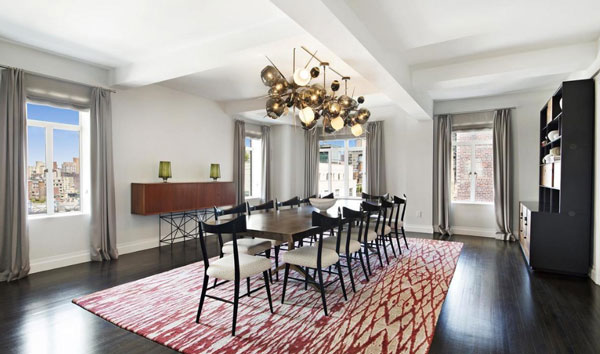When a condominium owner at Extell Development’s One57 approaches broker Robert Dankner about selling, these days he tells them all the same thing.
Don’t do it.
“I talk myself out of a potential commission, but it’s good advice… there’s no way for a graceful exit right now,” the Prime Manhattan Realty president said. He advises clients that, unless they want sell at a loss, they should stick to renting their One57 pads out.
“A lot of investors have to realize… to make a profit in a flip in new construction you need a price acceleration of at least 10 percent to even make a scratch,” he said.
But that sector of the market has not accelerated by 10 percent. Condo buyers are signing contracts at high-end new developments at 15 to 20 percent lower than they were in the peak of the luxury market in 2014, according to estimates from appraisal firm Miller Samuel. Anyone who bought a luxury condo two or three years ago and is now trying to sell is faced with falling prices and a glut of new product that, in Manhattan, is still growing.
That not-so-perfect storm, sources said, is pushing those sellers into a challenging position. And in some cases, it’s forced them to list their apartments for even lower than what they paid, openly advertising they’re willing to take a hit.
“It’s painful, I try to not think about it when there’s been a huge loss for my seller,” said Patricia Shiah, a broker with Stribling & Associates who marketed former Avon CEO Andrea Jung’s apartment at Toll Brothers’ 1110 Park Avenue, that sold in August for $17 million, an approximate $600,000 loss on what Jung paid last year. “It isn’t easy, but [sellers] understand that there is a change in the market, and if they want to sell they have to make adjustments.”
In the case of 1110 Park Avenue and other buildings in the city, these private sellers are also competing with the sponsor’s remaining units.
“In a market that people view as declining, if you are not going to undercut the sponsor — I don’t see that you are going to sell it,” said Douglas Elliman’s Sabrina Saltiel. “Unless you have one of the premium units and there’s [no new ones] left.”
Swimming upstream
Here’s the basic math on why those who are reselling recently purchased new condos are in a bind.
While sponsors in the current market are more inclined to take on the sale taxes, most new development buyers from a few years ago — when the market was hot — did not receive those advantages.
The taxes come in at around 2.5 percent, so a buyer of a $10 million new condo would have forked out around $250,000. Additionally, when the market is sizzling, developers will nudge their attorney fees — which run into the thousands of dollars — onto the buyer.
But when the new development buyer goes to sell, it’s a totally different story.
In resales, the seller takes on taxes and costs themselves, as well as wearing the broker commission. So a seller who’s got their unit up for the same or lower price than what they paid is wearing an even bigger loss than the price reflects. “It’s an investment — but you can’t just assume you will make money,” said Saltiel. “You can also lose money on a stock.”
But some could be forgiven for hoping. “It used to be that by the time the condo was built you would make 25 percent… [but] a lot of the new construction didn’t turn out as a good as they said it would,” said Michele Kleier, of Kleier Residential, who this year flipped a contract at 10 Madison Park West for a profit. “The secret is to buy early on… 10 Madison Square Park is a good building, but not everyone has made profit there.”
An analysis by The Real Deal found a number of buyers willing to take a loss on a pad they recently bought.
At Corigin Real Estate Group’s 20 East End Avenue, an apartment that went under contract in 2015 and closed in August for $4.6 million is back on the market for $4.4 million. The listing broker refused to comment.
Harry Macklowe’s conversion at 737 Park Avenue has one sponsor unit left, and a resale there is on the market for $25 million — a $500,000 drop on what the seller paid the developer in 2014. The listing broker did not respond to a request for comment.

737 Park Avenue, 19A
Meanwhile, at 56 Leonard Street, a four-bedroom is on the market for $13.9 million, down from the $13.98 million the seller paid to the sponsor. The broker was not immediately available for comment.
And actor Mike Meyers took a $675,000 loss on a pad he bought at celeb-studded 443 Greenwich Street earlier this year.
Sources said it depends on the building and, of course, personal circumstances, but ultimately it’s all about when you bought and when you sold.
“Time usually takes care of these ills,” said Dankner. “But that’s not something you can force.” Rutenberg’s Jeffrey Fields said, in regards to timing, he’s telling clients to steer clear of Billionaires’ Row because of falling prices.
“There’s too much in the pipeline….. why jump in now when you could jump in in 12 months?”
At Silverstein Properties’ 157-unit condo 30 Park Place — which is 80 percent sold according to the company’s latest summer update — a four-bedroom unit resale is advertised for $11.6 million, which is $1.4 million less than what the seller paid the sponsor earlier this year.
The listing broker, Douglas Elliman’s Tal Alexander, declined to comment specifically on the pricing.
However, he noted he is also marketing a resale unit at 432 Park Avenue for $28.5 million, a $4 million increase on what the sellers paid to the developer in 2016. They are shooting for a profit there, Alexander said, because even though they are competing with sponsors units, they’ve been able to price competitively.
“There’s also staging that you can do,” he said. “The buyer can come in and picture themselves living in it.”
Competing with developers
Alexander’s experience in competing against sponsors is somewhat common. With new condos now taking much longer to sell out, private sellers are increasingly duking it out with the people they bought their unit from.
“It’s pricing and it’s what your style is, and explaining why someone is selling so quickly,” said Brown Harris Stevens’ Lisa Lippman, noting she has sold resales at Extell’s 535 West End Avenue and the Laureate at 2150 Broadway before the buildings had sold out. The key, she said, is pushing the fact that even though it’s not brand new, there are advantages to picking up a resale over a sponsor unit. “When you buy from the sponsor you have to do window treatments, closets and things like that,” Lippman said.
Others noted it’s only difficult if you are going up against the exact same type of sponsor unit.
What’s more, brokers said, the fact taxes will be handled by the seller is a major marketing point.
“It’s a big advantage,” said Triplemint’s GieFaan Kim who said he sold one of the first resales at the Stahl Organization’s 388 Bridge Street in Brooklyn. In that borough, he said, resales in recent new developments are still selling well because of depleting inventory and increasing prices. Still, it can be hard work if the sponsors starts throwing in sweeteners — sometimes in addition to price cuts — in order to get their units sold.
“If you are competing against the building they [can sometimes] start floating all these different things,” Kim said. “I can always go to the seller and say ‘just letting you know, this is what the sponsor is starting to do for the building, now would you be willing to match that or offer some type of concession at your end?’”
But in a market that many view as falling in Manhattan, having resales and sponsor units listed at the same time can cause friction — particularly if sponsors themselves start cutting the price.
“There are lots of buyers out there who are finding that their assets are being devalued by their own sponsor,” Douglas Elliman’s Frances Katzen told the Wall Street Journal this week. “I think that there are plenty of people who are very angry to see that.”
But some brokers who are competing against sponsors said if your resale unit is unique, the sellers can turn a profit — even if there are sponsor price cuts.
“I’m not worried, I don’t think the sponsor will devalue the unit,” said the Corcoran Group’s Vickey Barron, who is marketing a resale at 30 Park Place for $16.9 million, up from the $13.7 million the seller paid in March. “It’s up to the buyer to identify where the value is.”

30 Park Place, 76B
Developers don’t want to be competing with resales either. Many restrict buyers from selling their units for at least a year after closing.
“We recommend that the bylaws contain a provision that says that,” said Jane Rosenberg, an attorney at Seiden Schein, a firm that has represented developers like Toll Brothers and the Chetrit Group.
While two other real estate lawyers told TRD those provisions may be weak to legal challenge, brokers said most sponsors are adamant about stopping buyers flipping their contracts or the unit in the early days after closing.
“Most projects I have worked on have a 12-to-18-month restriction on reselling,” said CORE’s Doron Zwickel, noting Izaki Group Investments was strict about it at their condos at 93 Worth Street, 15 Renwick Street and the Flynn at 155 West 18th Street.
“If the sponsor had a two-bedroom and someone was trying to resale a two-bedroom, we prevented that from happening,” he said, adding that at 93 Worth the developer required a reseller to pay a portion of the profit to the developer if the restriction was still in place.
But some brokers think there’s still money to be made.
“It’s just managing people’s expectations and being realistic,” said Rutenberg’s Anjollie Feradov, who since last month has been marketing a two-bedroom resale at One57 for just under $7.7 million — up from the $5.5 million the seller paid in 2015.
“The brokers [at One57] have seven listings, and their average [price per square foot] is $3,794,” she said, although she did not include the 85th-floor listing at the building, which is asking $70 million. “The sponsor has 11 listings, their average is $4,729 per square foot.”
This gives the resellers a competitive edge, she argued.
“The brokers’ units are much closer to the market.”
Adam Pincus contributed to reporting.

